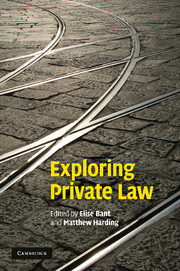Book contents
- Frontmatter
- Contents
- List of Contributors
- Foreword
- Acknowledgments
- Table of Cases
- Table of Legislation
- Introduction
- I Method
- 1 Do top-down and bottom-up reasoning ever meet?
- 2 Internationalization or isolation: the Australian cul de sac? The case of contract law
- 3 The Australian law of restitution: has the High Court lost its way?
- 4 Privacy and private law: developing the common law of Australia
- 5 Towards legal pragmatism: breach of confidence and the right to privacy
- 6 Teaching trust law in the twenty-first century
- II Unjust enrichment
- III Equity and trusts
- IV Remedies
- Index
- References
5 - Towards legal pragmatism: breach of confidence and the right to privacy
Published online by Cambridge University Press: 10 November 2010
- Frontmatter
- Contents
- List of Contributors
- Foreword
- Acknowledgments
- Table of Cases
- Table of Legislation
- Introduction
- I Method
- 1 Do top-down and bottom-up reasoning ever meet?
- 2 Internationalization or isolation: the Australian cul de sac? The case of contract law
- 3 The Australian law of restitution: has the High Court lost its way?
- 4 Privacy and private law: developing the common law of Australia
- 5 Towards legal pragmatism: breach of confidence and the right to privacy
- 6 Teaching trust law in the twenty-first century
- II Unjust enrichment
- III Equity and trusts
- IV Remedies
- Index
- References
Summary
Introduction
In How Fiction Works, literary critic James Wood compares literary fiction with moral philosophy. As Wood explains, while fiction and especially novels are concerned with the reality of human existence, there is a certain persuasive criticism of much modern moral philosophy that it ‘essentially wrote the messiness of the self out of moral discussion’. The critique is shared by philosopher Bernard Williams who argues that modern Kantian philosophers tend to view moral dilemmas as easily solved by identifying then elevating the correct ‘universal’ moral principle while in reality life may involve more than one possible moral stance and people who respond differently to moral choices, their decisions influenced by a range of factors – genetics, upbringing, society and so on. Similarly, philosopher and law academic Cass Sunstein notes that:
The hard question, not yet fully elaborated in the philosophical literature, remains: How does one make choices in cases in which incommensurable social goods are at stake, and in which some of these goods must be sacrificed?
As Sunstein points out, in Anglo-American jurisprudence the judge's traditional response to such problems is to avoid confronting them head on, adopting instead a process of incremental reasoning in which previous decisions of judges on like questions are taken as the starting point for resolving the case at hand, the focus is on the particulars of disputes, and legal positions are incompletely theorized in advance.
- Type
- Chapter
- Information
- Exploring Private Law , pp. 109 - 124Publisher: Cambridge University PressPrint publication year: 2010
References
- 1
- Cited by



